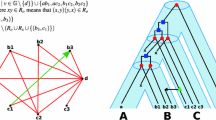Abstract
The common intervals of two permutations on n elements are the subsets of terms contiguous in both permutations. They constitute the most basic representation of conserved local order. We use d, the size of the symmetric difference (the complement of the common intervals) of the two subsets of 2{ 1, ⋯ ,n} thus determined by two permutations, as an evolutionary distance between the gene orders represented by the permutations. We consider the Steiner Tree problem in the space (2{ 1, ⋯ ,n},d) as the basis for constructing phylogenetic trees, including ancestral gene orders. We extend this to genomes with unequal gene content and to genomes containing gene families. Applied to streptophyte phylogeny, our method does not support the positioning of the complex algae Charales as a sister group to the land plants.
Preview
Unable to display preview. Download preview PDF.
Similar content being viewed by others
References
Bérard, S., Bergeron, A., Chauve, C.: Conservation of combinatorial structures in evolution scenarios. In: Lagergren, J. (ed.) RECOMB-WS 2004. LNCS (LNBI), vol. 3388, pp. 1–14. Springer, Heidelberg (2005)
Bergeron, A., Blanchette, M., Chateau, A., Chauve, C.: Reconstructing ancestral gene orders using conserved intervals. In: Jonassen, I., Kim, J. (eds.) WABI 2004. LNCS (LNBI), vol. 3240, pp. 14–25. Springer, Heidelberg (2004)
Bergeron, A., Heber, S., Stoye, J.: Common intervals and sorting by reversal: a marriage of necessity. Bioinformatics 18, S54–S63 (2002)
Bergeron, A., Stoye, J.: On the similarity of sets of permutations and its applications to genome comparison. In: Warnow, T.J., Zhu, B. (eds.) COCOON 2003. LNCS, vol. 2697, pp. 69–79. Springer, Heidelberg (2003)
Booth, K., Luekar, G.: Testing for the consecutive ones property, interval graphs, and graph planarity using PQ-tree algorithms. Journal of Computer and System Sciences 13, 335–379 (1976)
Bourque, G., Pevzner, P.A.: Genome-scale evolution: reconstructing gene orders in the ancestral species. Genome Research 12, 26–36 (2002)
Caprara, A.: On the practical solution of the reversal median problem. In: Gascuel, O., Moret, B.M.E. (eds.) WABI 2001. LNCS, vol. 2149, pp. 238–251. Springer, Heidelberg (2001)
Fitch, W.: Toward defining the course of evolution: Minimum change for a specific tree topology. Systematic Zoology 20, 406–416 (1971)
Hartigan, J.A.: Minimum mutation fits to a given tree. Biometrics 29, 53–65 (1973)
Lemieux, C., Otis, C., Turmel, M.: Ancestral chloroplast genome in Mesostigma viride reveals an early branch of green plant evolution. Nature 403, 649–652 (2000)
Meidanis, J., Munuera, E.G.: A theory for the consecutive ones property. In: Ziviani, N., Baeza-Yates, R. (eds.) Proceedings of WSP 1997 - Third South American Workshop on String Processing, pp. 194–202. Carleton University Press, Ottawa (1996)
Nadeau, J.H., Taylor, B.: Lengths of chromosomal segments conserved since divergence of man and mouse. Proc. Natl. Acad. Sci. USA 81, 814–818 (1984)
Ohyama, K., Fukuzawa, H., Kohchi, T., et al.: Chloroplast gene organization deduced from complete sequence of liverwort Marchantia polymorpha chloroplast DNA. Nature 322, 572–574 (1986)
Parida, L.: A PQ tree-based framework for reconstructing common ancestors under inversions and transpositions. IBM Research Report RC 23837 (2005)
Sankoff, D., Blanchette, M.: The median problem for breakpoints in comparative genomics. In: Jiang, T., Lee, D.T. (eds.) COCOON 1997. LNCS, vol. 1276, pp. 251–263. Springer, Heidelberg (1997)
Sankoff, D., Bryant, D., Deneault, M., Lang, F., Burger, G.: Early eukaryote evolution based on mitochondrial gene order breakpoints. Journal of Computational Biology 7, 521–535 (2000)
Sankoff, D., Rousseau, P.: Locating the vertices of a Steiner tree in an arbitrary metric space. Mathematical Programming 9, 240–246 (1975)
Sankoff, D., Sundaram, G., Kececioglu, J.: Steiner points in the space of genome rearrangements. International Journal of the Foundations of Computer Science 7, 1–9 (1996)
Siepel, A., Moret, B.: Finding an optimal inversion median: Experimental results. In: Gascuel, O., Moret, B.M.E. (eds.) WABI 2001. LNCS, vol. 2149, pp. 189–203. Springer, Heidelberg (2001)
Tang, J., Moret, B.M.E.: Phylogenetic reconstruction from gene-rearrangement data with unequal gene content. In: Dehne, F., Sack, J.-R., Smid, M. (eds.) WADS 2003. LNCS, vol. 2748, pp. 37–46. Springer, Heidelberg (2003)
Telles, G.P., Meidanis, J.: Building PQR trees in almost-linear time. In: Feofiloff, P., de Figueiredo, C.M.H., Wakabayashi, Y. (eds.) Proceedings of GRACO 2005. Electronic Notes in Discrete Mathematics, vol. 19, pp. 1–416 (2005)
Turmel, M., Otis, C., Lemieux, C.: The chloroplast and mitochondrial genome sequences of the charophyte Chaetosphaeridium globosum: insights into the timing of the events that restructured organelle DNAs within the green algal lineage that led to land plants. Proc. Natl. Acad. Sci. USA 99, 11275–11280 (2002)
Turmel, M., Otis, C., Lemieux, C.: The complete chloroplast DNA sequences of the charophycean green algae Staurastrum and Zygnema reveal that the chloroplast genome underwent extensive changes during the evolution of the Zygnematales. BMC Biology 3, 22 (2005)
Turmel, M., Otis, C., Lemieux, C.: The chloroplast genome sequence of Chara vulgaris sheds new light into the closest green algal relatives of land plants. Mol. Biol. Evol. 23, 1324–1338 (2006)
Author information
Authors and Affiliations
Editor information
Editors and Affiliations
Rights and permissions
Copyright information
© 2006 Springer-Verlag Berlin Heidelberg
About this paper
Cite this paper
Adam, Z., Turmel, M., Lemieux, C., Sankoff, D. (2006). Common Intervals and Symmetric Difference in a Model-Free Phylogenomics, with an Application to Streptophyte Evolution. In: Bourque, G., El-Mabrouk, N. (eds) Comparative Genomics. RCG 2006. Lecture Notes in Computer Science(), vol 4205. Springer, Berlin, Heidelberg. https://doi.org/10.1007/11864127_6
Download citation
DOI: https://doi.org/10.1007/11864127_6
Publisher Name: Springer, Berlin, Heidelberg
Print ISBN: 978-3-540-44529-6
Online ISBN: 978-3-540-44530-2
eBook Packages: Computer ScienceComputer Science (R0)




